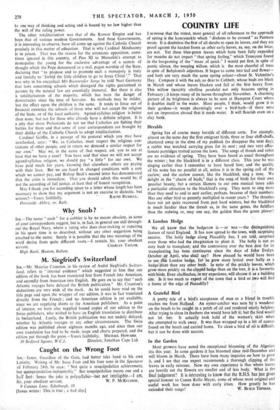Roman Catholic Schools
SIR,—Can I say without offence that I believe your paper intends to be fair? And yet over the Catholic schools you have shown strong aversion even to entertaining arguments advanced in the name of justice. You have now told us why. You have again linked the matter with the Catholic attitude towards reunion. Most of us have some "Armada complex," and we suffer from the danger of allowing our sense of justice on one question to be obscured by our emotional reaction on another. You will answer that these questions are interlocked. The real argument against Catholics on this school question is not that they fail to make out how serious or even how just their case may be, but that the claim of the Catholic Church to be the only true Church is "totalitarianism pure and simple," and it is too much to ask taxpayers "to bear the whole burden of schools where such a doctrine is inculcated." That is a serious argument, and I think that we on our part must face it. I suggest that you should also face the possibility that those who advance your argument are falling into a common human failing, and accusing others of the very defect by which they themselves are being misled: totalitarianism.
What does " totalitarianism " mean? If it means the claim to possess the whole truth and to be unable to compromise it, that has always been characteristic of Christianity. The Roman Empire persecuted Christians precisely because they refused to take part in other religions and burn a little incense before the Emperor's statue, as everyone else did. This was the pertinaciam and infiexibilem obstinationem which that well- intended Governor, Pliny, punished with death. But they were " totali- tarian " only in the sense that truth is totalitarian. I am far from defending aft historical actions of Christians, Protestant or Catholic, but ills Christian doctrine, embodied by the Catholic Church in her code of canon law, that "nobody should be compelled to embrace the Catholic faith against their will" (Canon 1351). This is the very opposite Of that political totalitarianism which seeks to force everyone to conform
to one way of thinking and acting and is bound by no law higher than the will of the ruling power.
The other totalitarianism was that of the Roman Empire and has been that of various modern Governments. And these Governments, it is interesting to observe, have all come up against the ,Catholic Church precisely in this matter of education. That is why Cardinal Mindszenty is in prison. That was the reason for the strenuous opposition, some- times ignored in this country, of Pius XI to Mussolini's attempt to monopolise the young for the exclusive advantage of a system of thought which the Pope denounced as a real, pagan worship of the State, declaring that "to propose and to promote such a monopoly is truly and literally to forbid the little children to go to Jesus Christ '." That was why in his encyclical Mit Brennender Sorge he told Nazi Germany that laws concerning schools which disregard the rights guaranteed to parents by the natural law are essentially immoral. But there is also a totalitarianism of the majority, which has been the danger of democracies since the time of Socrates. Its methods may be milder, but the effect upon the children is the same. It tends to force out of financial existence the schools of those who will not accept the religion of the State, or of the local authority. Agreed-syllabus religion is better than none, but not for those who already have a definite religion. It is a pity that more Protestants do not see that Catholics are fighing their battles for them and that some of your correspondents are brought by their dislike of the Catholic Church to adopt totalitarianism.
Cardinal Griffin, in a passage of his pastoral which you may have overlooked, says: "We, as Catholics, must respect the religious con- victions of other people, and in return we demand a similar respect for our own." May we, in the name of that respect, ask you to see at least that we have a case? You have said that since we will not accept agreed-syllabus religion, we should pay "a little" for our own. We have paid much for years, knowing that elsewhere others are paying with their lives. But we are faced in changed conditions with a sum which we cannot pay, and Bishop Beck's second letter has demonstrated that the crisis is immediate. That you should admit this would be, if not the according of full justice, at least-that of honest recognition.
May I thank you for according space to a letter whose length has been necessary to show that my argument is not an exercise in dialectic, but



































 Previous page
Previous page